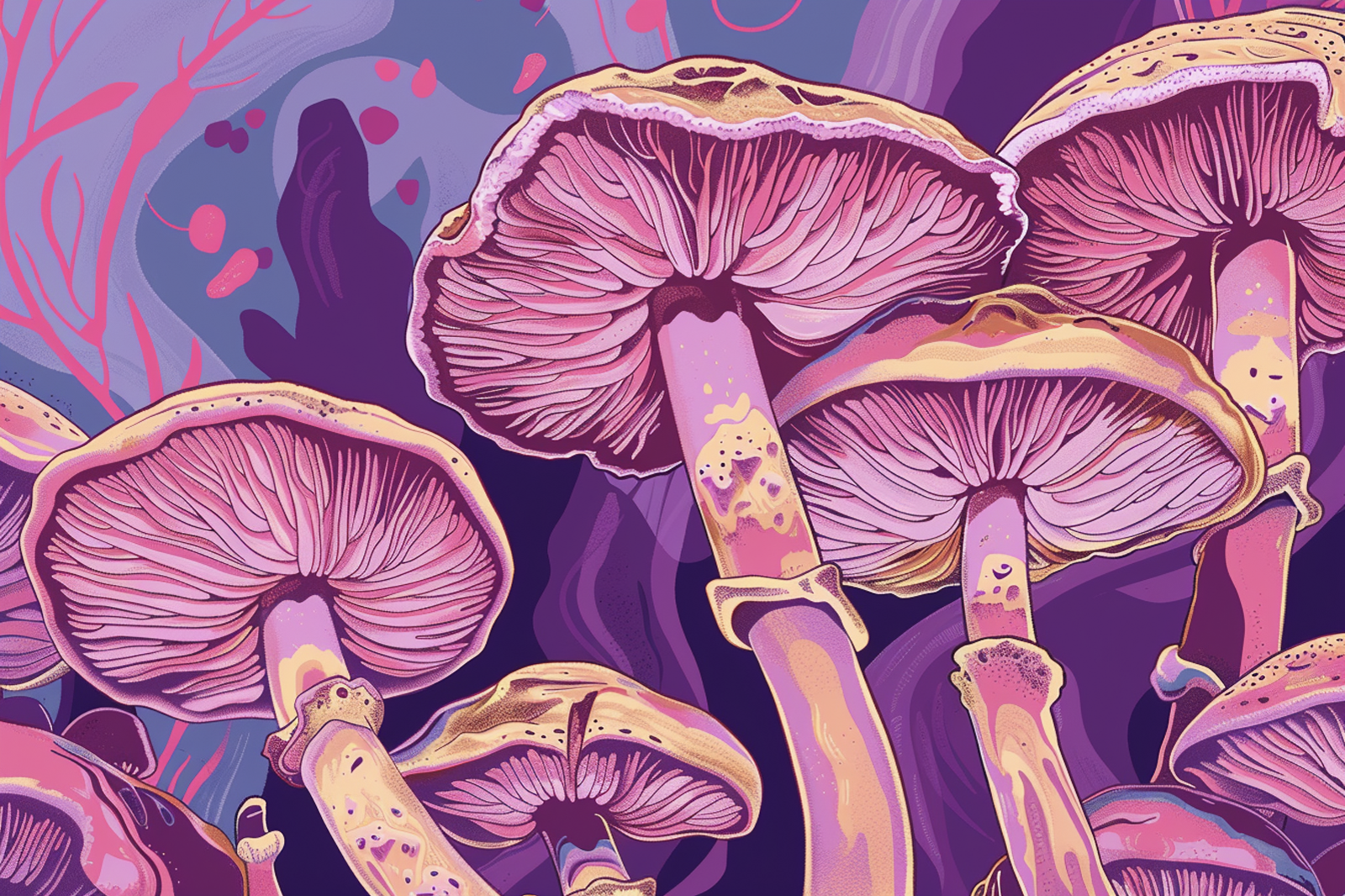

What is the Most Powerful Adaptogen?
Published:
Updated:
Stress in life should not be a hindrance but a powerful driving force. But sometimes, stress can be difficult to manage. This is the perfect time to lean on adaptogens.
If you want to understand how these plants help us manage stress, this is the place for you. This article will unfold the concept of adaptogens. We will talk about its functions and medical benefits, and we will tell you which are the most powerful adaptogens.
But first, it's essential to review the definition of what got us here.
Key Takeaways
- Adaptogens are substances primarily used in herbal medicine that can help increase resistance to stress, promote homeostasis, and stabilize physiological processes. They are not yet fully supported by the scientific community, but many cultures have used them for their therapeutic properties.
- Some possible benefits of adaptogens include regulating cortisol levels, reducing symptoms of stress, improving cognitive function, boosting the immune system, and improving energy and stamina levels.
- Adaptogens may be a natural alternative to caffeine, as some adaptogens have been shown to have stimulating effects without the side effects associated with caffeine. However, more research is needed to fully understand their effects and potential risks.
- There are many different types of adaptogens, each with their own unique functions and benefits. Some of the most potent adaptogens include cordyceps, ginseng, and rhodiola.
What are Adaptogens?
The concept of adaptogens dates back to 1947.
The word refers to certain substances primarily used in herbal medicine that can increase resistance to biological stress, promote homeostasis, and help with the stabilization of certain physiological processes.
Many existing studies on adaptogens date back to the 1980s and were conducted by the former Soviet Union, China, and Korea, but most have been dismissed due to methodological flaws.
The current scientific community, the European Union, and the FDA do not support the term adaptogen. They state that conclusive studies are still needed regarding the efficiency of "adaptogenic" substances to help relieve stress.
Nevertheless, the term adaptogen is quite popular in marketing, holistic medicine, and some alternative medicine systems.
There are a lot of plants and fungi currently categorized as adaptogens. Despite the discrepancies regarding the term adaptogens with which they are currently known, various cultures such as Ayurveda and traditional Chinese medicine have been using plants and fungi with undeniable therapeutic properties.
Adaptogen Benefits
Users and specialists in naturopathic medicine recommend mushrooms, plants, and adaptogenic herbs to help the body overcome the influences and consequences of chemical, physical, or biological stress.
Some of the possible benefits that adaptogens could provide are:
- It helps regulate cortisol levels, also known as the "stress hormone," and balances other hormones
- Combat high cortisol levels symptoms such as depression, anxiety, fatigue, insulin resistance, obesity, and tiredness or fatigue
- Reduces the impact that stress has on cognitive functions
- They help to better deal with the results of physical and emotional fatigue
- Stimulates mental performance impacted by stress
- Improves attention
- Boosts the immune system
- Normalizes bodily functions
- It improves energy levels and significantly increases stamina levels
- It improves the functions of some organs, such as the liver and the adrenal glands
- It improves the functions of body systems such as the gastrointestinal system
Adaptogens vs. Caffeine
Caffeine is a widely popular substance used worldwide to boost energy levels. However, the manual of statistics and diagnosis of mental disorders speaks of caffeine intoxication with amounts of just 250 mg that could trigger nervousness, rest disorders, anxiety, overexcitement, and insomnia.
Many sports supplements contain between 200 to 400 mg per serving, posing potential risks for some users. The government and the FDA believe that there is an abusive use of caffeine, and that is why it has begun to regulate the caffeine content in some products.
Today's caffeine alternative stimulants have been drawing customers' attention around the country and the world.
Such is the case with adaptogens.
These types of substances and supplements are not as well known as caffeine. This is also due to the lack of information and studies that fully confirm many adaptogens' effects.
Some adaptogens have been shown to have stimulating effects on performance and recovery. They also can stimulate athletic performance, regulate physical and mental stress, and even stimulate cognitive performance and work capacity without side effects during withdrawal.
Some people believe that adaptogens could be an excellent natural substitute to help reduce caffeine intake.
For example, ginseng is shown to have effects that may help fight stress and increase concentration and memory. However, even in the case of adaptogens, the adage that "too much is bad" applies as too much ginseng can lead to insomnia and is not recommended for use by children or pregnant women.
In fact, the use of ginseng for more than six months is unsafe since there are not enough studies about its side effects.
Some users report similar side effects with long-term use of cordyceps, which most people consider safe for short-term oral consumption. But, there is not enough reliable information about cordyceps in pregnant or breastfeeding women.
There is evidence that prolonged use of cordyceps may increase the risk of pronounced bleeding processes and could negatively affect people with autoimmune conditions.
Either way, we can summarize that we still need more studies on adaptogen supplementation to consider them one hundred percent safe for all people.
Test studies analyze cordyceps' real possibilities to improve adaptability and physical and mental performance. But, the wisest and most recommended thing is to always consult with your health provider before adding an adaptogenic supplement to your diet.
Most Powerful Adaptogen
In nature, there are different types of adaptogens, each one with different functions and qualities. Defining a single type of adaptogen as "the most powerful" would perhaps be a mistake since not all adaptogens work the same.
From plants, fungi, and some peculiar intermediates between both, there are different adaptogens that, in addition to the characteristic qualities to help deal with biological stress, can also bring various additional benefits.
Some of the most potent adaptogens are:
Cordyceps
Cordyceps is one of the most beneficial mushrooms for general well-being. Evidence suggests that cordyceps could improve oxygen uptake at the cellular level, which translates into increased endurance, especially when practicing physical activities that require endurance.
Some Asian cultures have used it for centuries as an energy booster and aphrodisiac.
This type of mushroom that grows elongated is native to the high elevation areas of Tibet and the Himalayas, where people have been using cordyceps for more than five thousand years to increase their physical capacity.
Cordyceps is an excellent addition to any supplement but can also be taken on its own. However, as with many supplements, many people have concerns about the best time to take cordyceps, dosage, and how often.
Turmeric
Yes, we refer to the usually powdered yellow spice that many people recognize from curries. But did you know that turmeric is also an adaptogen? In addition to being a sour, earthy spice used to add depth to robust flavors, it is also a medicinal herb native to South Asia and a member of the ginger family.
The taste of turmeric can be a bit strong and even off-putting when used too much. But, there are some tricks you can apply to balance out too much turmeric.
In addition to adding flavor to foods, turmeric can bring certain potential benefits to human health. Evidence suggests that it provides anti-inflammatory and antioxidant benefits, that it can improve memory and learning, and could counteract depression.
Turmeric even has anti-cancer properties. It is no accident that turmeric has been used for so long in the Ayurvedic and other Indian medicinal systems.
Ashwagandha
Ashwagandha or Withania Somnifera, also known as Indian ginseng, winter cherry, or poisonous gooseberry, is a shrub native to India and some parts of Africa with nootropic qualities that could provide therapeutic effects and potential health benefits to people.
Ashwagandha is also a popular medicine within the Ayurvedic system of medicine, and the primary function of this herb is as an anxiolytic.
Ashwagandha seems to work perfectly as an adaptogen as it appears to have the ability to relax the brain, reduce bloating, produce sleepy effects, lower blood pressure, and decrease cravings.
These effects of ashwagandha on the human body can help us better deal with external stressors by reducing cortisol levels generated by anxiety and stress. The stress-relieving effects of ashwagandha are widely popular. But some people wonder what the best time to take ashwagandha for treating anxiety is.
Still, the truth is that this may depend on your pre-existing conditions and what exact benefits you want from this adaptogenic herb.
Shatavari
Shatavari is a widely popular root in Ayurveda used to treat problems affecting the female reproductive system, such as menopausal symptoms, menstrual pain, and premenstrual syndrome.
Shatavari, or Asparagus racemosus, is a plant in the asparagus family that grows primarily in India, Nepal, Sri Lanka, and parts of Australia. It is also called wild asparagus or Indian asparagus, although it has little to do with the common asparagus.
Women mainly with irregular menstrual cycles, menopausal problems, or who want to improve their fertility are the ones who often take Shatavari. The thick roots of this plant are where its active ingredients are concentrated.
These roots are dried and ground into a fine powder called "churna" in Ayurveda. You can also get an extract from them.
Tulsi
Tulsi or Ocimum tenuiflorum, popularly known as purple basil, is an aromatic plant of the Lamiaceae family and a close relative of common basil. The Tulsi is sacred to Hinduism, and the Philippines call it balanoi.
In addition to the culinary and religious uses given to this plant, Tulsi plants also seem to have medicinal qualities.
This plant appears in the Charaka-samjita, an ancient Ayurvedic text popular in traditional Indian medicine. Modern science also seems to have found some evidence to support the belief that Tulsi may have therapeutic applications.
There is preliminary evidence to suggest that orally administered tulsi extracts might prevent cataracts and even protect cells against damage caused by radioactivity.
Moringa
This plant has a high content of vitamins and minerals. Its scientific name is Moringa oleifera, but it is called the tree of life because of its remarkable medicinal properties.
Moringa is rich in iron, carotenoids, vitamin C, polyphenols, and quercetin, which give it an antioxidant and anti-inflammatory effect.
The most used part of moringa is the leaf, and its therapeutic applications are multiple. It can improve breathing, reduce stress, weight loss, and even control blood glucose levels.
Moringa can be used to prevent diabetes, protect the heart, protect and nourish the skin, and improve the body's defenses. It is also a good vasodilator, an excellent antibiotic, antifungal, and generates antioxidant, anti-inflammatory, and analgesic effects.
Gotu Kola
Also known as Centella Asiatica, it is a plant probably native to South Asia that grows in humid or swampy places in Madagascar, India, Sri Lanka, China, and Mexico. It also grows in some areas of South America and South Africa.
Gotu Kola generates several effects that include anabolic, antiepileptic, nootropic, and vulnerary effects. This adaptogen may also have anti-inflammatory effects and may be antifibrotic, antitumor, and especially adaptogenic, helping us adapt to various stress types.
It could also be venotonic since it promotes venous circulation, and it can also have depurative effects.
Maca
Its scientific name is Lepidium meyenii, but it is also called Peruvian ginseng. It grows in the Peruvian Andes mountains. Maca is traditionally used as food, but it also has medicinal uses.
Maca powder is a rich source of essential vitamins and minerals. It is also rich in fiber, carbohydrates, and protein, has the potential to improve fertility in men and women, is rich in flavonoids that support mental health, increases energy, reduces menopausal symptoms, and even can shrink the prostate.
The maca root, which can be of different colors, is dried and consumed as a powder, although it is also used in capsules and liquid extract.
Rhodiola Rosea
Traditionally known simply as Rhodiola, this plant of the Crassulaceae family grows in the cold regions of the northern hemisphere, the Arctic coast, and adjacent countries, the alpine floor of the highest mountains, such as the Himalayas, the Rocky Mountains, the Alps, the Pyrenees, and the Carpathians.
People in the areas where it grows have used it throughout history to reduce fatigue, improve physical performance, help better withstand weather conditions, and better deal with altitude sickness.
It is currently considered an adaptogen that improves mood and treats depression. Rhodiola also serves as an anti-fatigue, antioxidant, anti-stress, antihypoxic, anticancer agent, immune stimulant, and sexual stimulant.
Panax (Asian) Ginseng
Panax is one of the most popular adaptogenic herbs on the market today. Its effects are really powerful, so you don't have to take too much of this adaptogen to experience them.
The anxiolytic properties of this root are genuinely unique and can be of great use in treating anxiety, stress, and forgetfulness.
Panax may also help regulate levels of the enzyme kinase, an enzyme related to high-stress levels in the body and an indicator that stress has begun to affect your circulatory system. Asian ginseng does not act directly as a cortisol blocker.
Instead, it works by regulating other stressors in the body, such as the adrenal gland and the levels of different neurotransmitters.
Schisandra Berry
Known in Chinese as Wuweizi, which means "berry of the five flavors." The Schisandra berry is a fruit with a truly unique flavor that includes the five primary flavors according to Chinese culture: sweet, sour, pungent, bitter, and salty.
Traditional Chinese medicine considers these berries to be one of the 50 fundamental herbs, and they are usually dried and boiled to make tea.
Modern alternative medicine considers the Schisandra plant an adaptogen that generates notable hepatoprotective and immune-boosting effects.
Schisandra berries can also help with infections, fatigue, and feelings of weakness. They are perfect to combat colds, asthma, or allergies, help with some respiratory issues, rhinitis, sinusitis, asthma, frequent coughs, and even improve vision.
Best Adaptogens to Lower Cortisol
There is a wide variety of different fungi, herbs, and adaptogenic plants that can generate different effects on the human body.
The herbal action of adaptogens can increase or decrease some chemical reactions within our body, such as the chemical reaction of stress that is related to the release of the hormone cortisol, popularly known as the stress hormone.
Adaptogens can help us better manage stress in physical, chemical, and biological contexts. Some adaptogens work better for some things than others. If you are looking for a type of adaptogen specifically effective at lowering cortisol levels, Rhodiola may be an intelligent choice.
In addition to helping regulate cortisol levels, Rhodiola also promotes weight loss and improves physical performance.
Besides Rhodiola, another highly effective and recommended option to reduce cortisol levels is ashwagandha, which is a recognized anxiolytic in Ayurvedic medicine.
Other adaptogens that can help regulate cortisol levels include chamomile and lemon balm.
Our TUNE IN drink could be the perfect solution for those who suffer from high cortisol levels. Our drink is expertly formulated to help manage stress, allowing you to be more focused, productive, and maintain overall wellness.
The blend of adaptogenic herbs in TUNE IN includes powerful ingredients like ashwagandha and rhodiola, known for their natural ability to help the body cope with stress. By working in harmony, these herbs can help balance cortisol levels and support the body's natural stress response.
Apart from adaptogenic herbs, TUNE IN also contains other ingredients that promote overall health and wellness.
Blog posts
-

Can Cordyceps Help with Weight Loss?
Find out how cordyceps, a type of medicinal mushroom, can potentially aid in weight loss and its benefits for overall health. -

Are Cordyceps Good for You?
Read on and find the health benefits of Cordyceps. Learn why Cordyceps are good for you and how they can boost your well-being. -

The Best Mushroom Coffee Alternative
Discover TUNE IN, your best mushroom coffee alternative for a delightful, energizing brew.
Sign up to our productivity newsletter
and get 10% off your first order.



